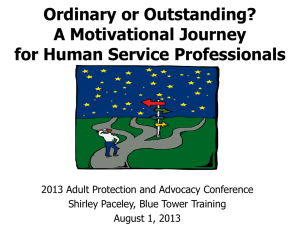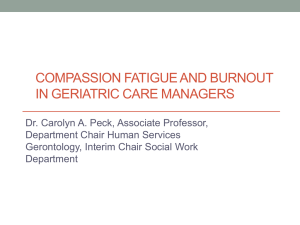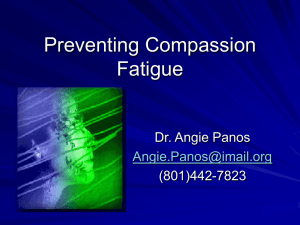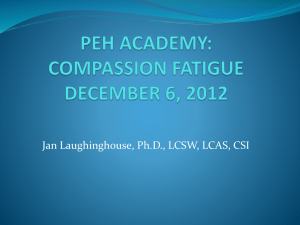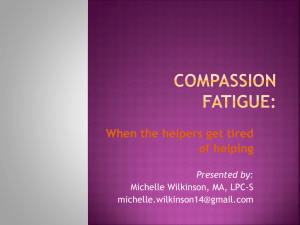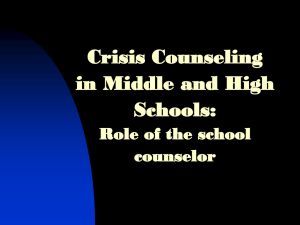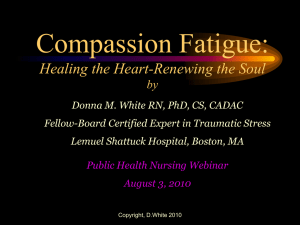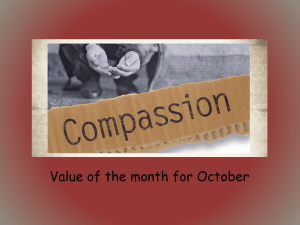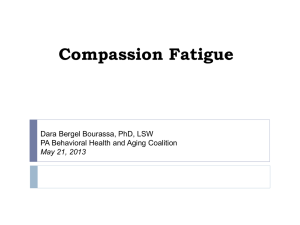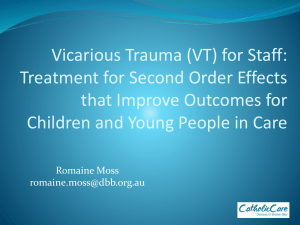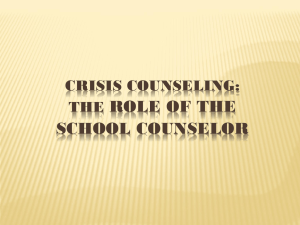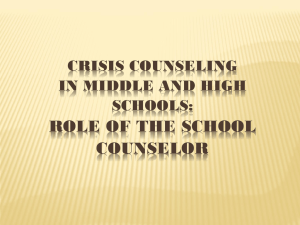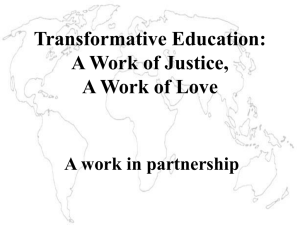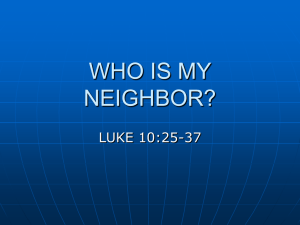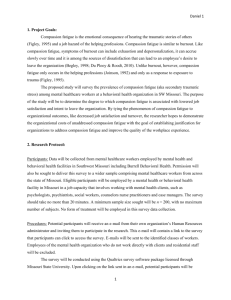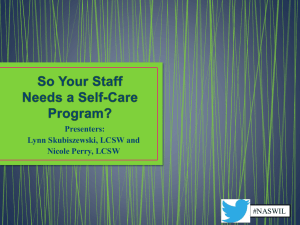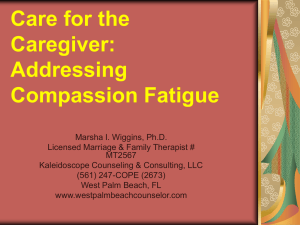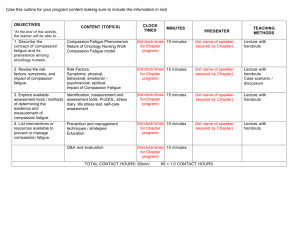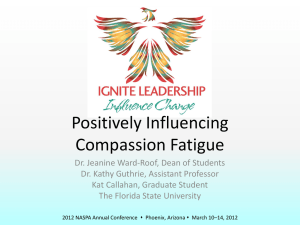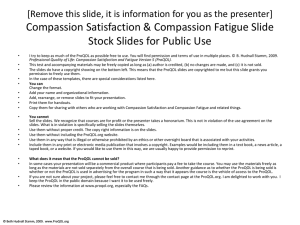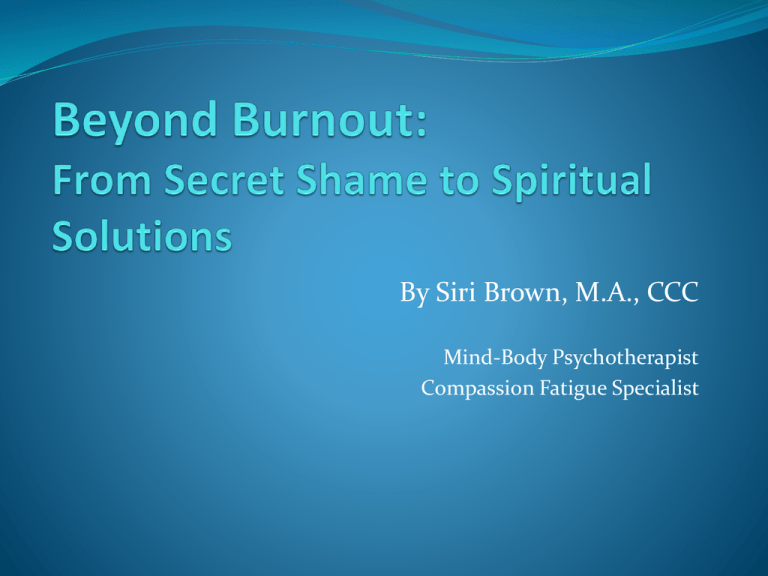
By Siri Brown, M.A., CCC
Mind-Body Psychotherapist
Compassion Fatigue Specialist
“In dealing with those who are undergoing great
suffering, if you feel “burnout” setting in, if you
feel demoralized and exhausted, it is best for the
sake of everyone, to withdraw and restore yourself.
The point is to have a long-term perspective.”
•
- Dalai Lama
My Story
tears, chest pains, compulsive exercise,
antidepressants, secret drinking &
shame
Exploring Internalized Beliefs about
our Professional Selves
Definitions: Burnout vs. Compassion Fatigue
Burnout: physical and/or emotional exhaustion as a
result of our work experiences and expectations.
Occurs over time, leads to diminished enjoyment of
both work and personal life.
Compassion Fatigue: emotional, physical and
psychological exhaustion experienced by one who
helps others. A result of accumulated stress and
trauma, can have rapid onset, leads to diminished
capacity to function personally as well as
professionally.
Recognizing Compassion Fatigue
Increased irritability with others,
ourselves
Sleep disturbances
Low tolerance for others’
problems/emotions
Depression (hopelessness, helplessness)
Physically drained
Decrease in hobbies/activities
Increased isolation from others
Feeling “numb” or emotionally
disconnected
Hypervigilance, hyperarousal
Difficulty relaxing, sleeping, unwinding
Increase in substance use
Engaging in compulsive behaviours
(food, sex, exercise, internet)
(see www.proqol.org for free self-asssssment tool)
Intrusive thoughts/images
Anxiety
Difficulty concentrating
Increase in illness and absenteeism
Decrease in work satisfaction
Not feeling effective as a helper; loss of
purpose, meaning
Feeling burdened by client problems
Preoccupation with client stories/issues
Psychosomatic symptoms (chest pains,
muscle tension, gastrointestinal distress,
headaches)
Deconstructing Compassion Fatigue
“an interactive, or synergistic, effect among primary
traumatic stress, secondary traumatic stress, and
burnout symptoms in the life of afflicted care
providers” (Gentry & Baranowsky)
PTS + STS + Burnout = CF
Primary Traumatic Stress: Result from anything
traumatizing you have experienced directly including
witnessing something happening to another/others.
physical, emotional or sexual abuse
injuries, accidents, medical/dental procedures
natural disasters, wars, combat
witnessing assault/suicide/homicide/death
perceived or anticipated physical harm or death
Results in latent vulnerability to Compassion Fatigue or
Secondary Traumatic Stress (you are more easily
“triggered” or “activated”)
Secondary Traumatic Stress (Vicarious Trauma):
When we experience traumatic stress symptoms
hypervigilance/hyperarousal
nightmares/intrusive memories
numbing/dissociation
as a result of listening to and/or being with
another/others who have been traumatized*.
* controlled empathy, nervous system regulation
So the million dollar question is…
How do we transform Burnout &
Compassion Fatigue into Compassion
Satisfaction & Vicarious Resilience?
Spiritual Solutions for Healing
from Burnout or Compassion Fatigue
Write a mission statement - who you aspire to be both personally
and professional
Cultivate & actively practice Self-Compassion
Connect! (to yourself, others, nature, the divine)
Regular spiritual practice - yoga, prayer, gratitude list,
affirmations, meditation, art, writing, dance, group gatherings
Personal healing work - psychotherapy, esp. mind-body
approaches such as sensorimotor, SRT, focusing, hypnosis, EFT;
bodywork, energy work, visualizations
Create nurturing space at work and home - rituals between
sessions, maintaining a “non-anxious presence”, grounding, cleanse
space, cleanse your energy field
Call on your “Spiritual Support Circle”
Creating your Spiritual Support Circle
Final Thoughts…
The work you do is amazing – undertaking the healing path of
helping others takes courage, commitment and a generous heart.
Therefore, take the time to honour and nurture yourselves,
without guilt, and you will be able to continue on your helping
journey with joy, energy, and compassion for all.
With love & light, and in gratitude to all those who give of
themselves,
Thankyou.
Siri Brown M.A., CCC
Resources & References
www.ccpa-accp.ca/blog/
www.compassionfatigue.ca
www.compassionfatigue.org
www.traumastressinstitute.org
www.self-compassion.org
www.psychologytoday.com/posts
www.psychink.com (Traumatology Institute website)
www.proqol.org (for Compassion Fatigue Assessment tool: Professional
Quality of Life: Compassion Satisfaction and Fatigue (ProQOL) Version 5)
Resources & References (cont.)
Baranowsky, A. & Gentry, E. (2010) Compassion Satisfaction Manual: Compassion Fatigue
Client Manual for the Accelerated Recovery Program
Baranowsky, A., & Gentry, E. (2010) Compassion Fatigue Specialist Training Workbook
(CFST) Accelerated Recovery Program
Baranowsky, A., & Gentry, E. (2010) Treatment Manual for the Compassion Fatigue
Accelerated Recovery Program
Cox, D. (2006) “The Edwin Friedman Model of Family Systems Thinking” in Academic
Leadership the Online Journal www.academicleadership.org vol.9 Issue 2 Spring 2011
Derr, M. (2008) The Use of Meditation and Mindfulness Practices to Support Military Care
Providers: A Prospectus
Hernandez, P. , Gangsei, D. & Engstrom, D. (2007) “Vicarious Resilience: A New Concept in
Work With Those Who Survive Trauma” in Family Process, Vol.46, No.2
Mate, G. (2003) When the Body Says No: The Cost of Hidden Stress. Toronto: Random
House.
Matthieu, F. (2007) Transforming compassion Fatigue into Compassion Satisfaction: Top
12 Self-Care Tips for Helpers
Rothschild, B. (2006) Help for the Helper: The Psychophysiology of Compassion Fatigue
and Vicarious Trauma. New York: W.W. Norton & Co.
Compassion Fatigue Trajectory
(from the Gentry & Baranowsky Model of Compassion Fatigue)
1. The Zealot Phase - enthusiastic, committed, believers
2. The Irritability Phase - distancing, lose focus, mocking, judging
3. The Withdrawal Phase - neglectful (self, others), clients are
“irritants”, blur together, exhaustion, “numbing” out
4. The Zombie Phase - disconnected to self, others; loss of
compassion, no longer “present”, loss of meaning/value
5. Pathology vs. Renewal/Maturation - illness, take leave or
change professions, ongoing distress/disatisfaction vs. hardiness,
resilience, transformation

